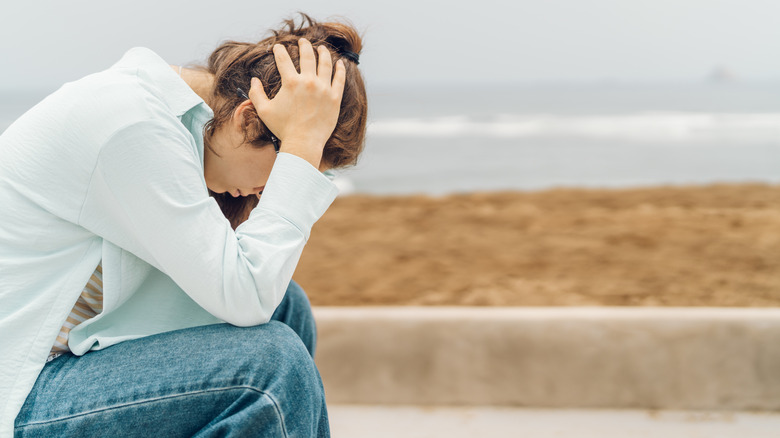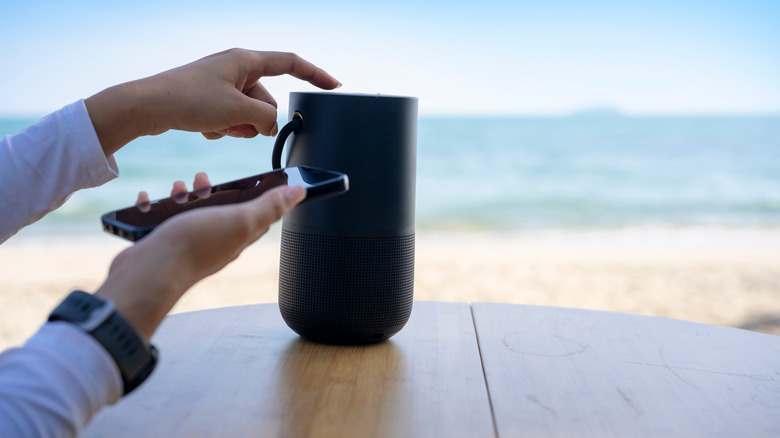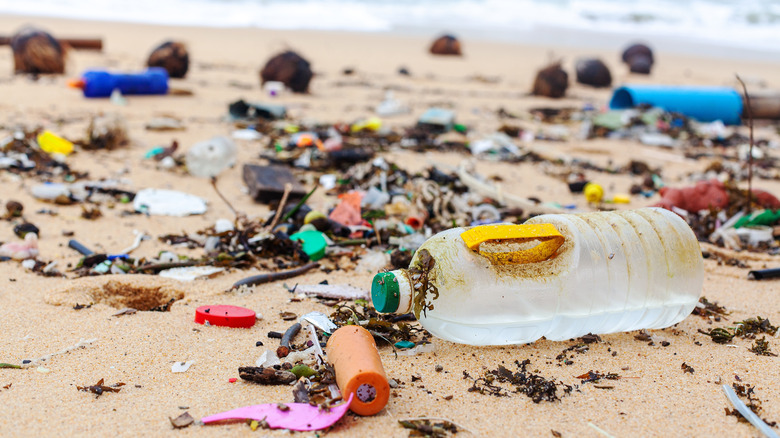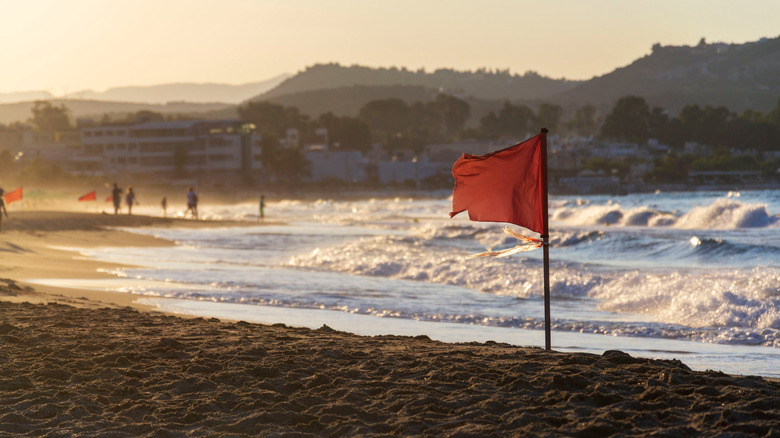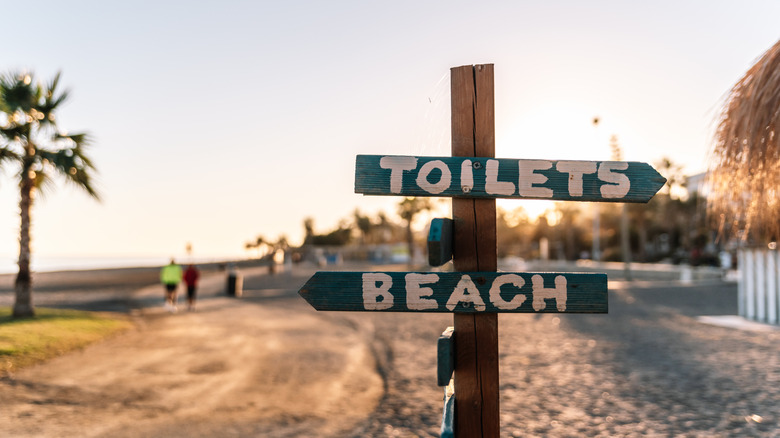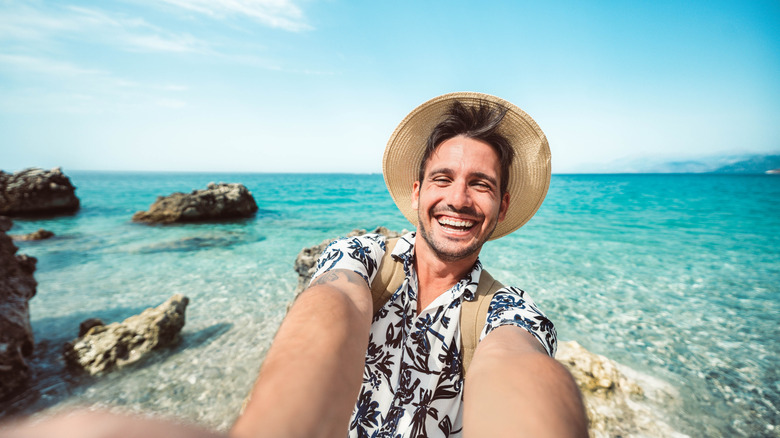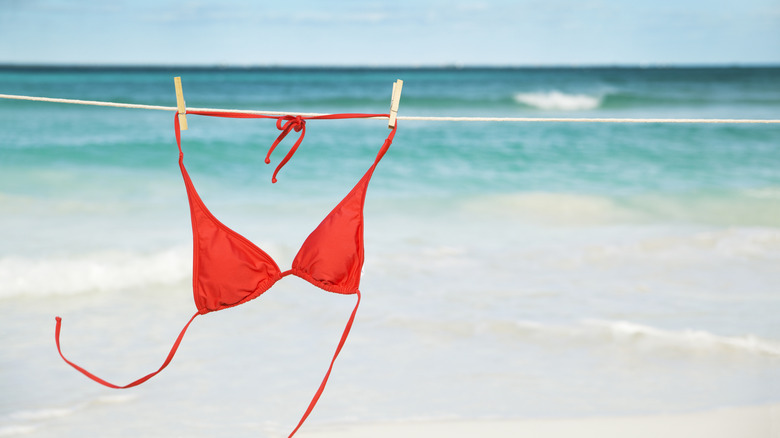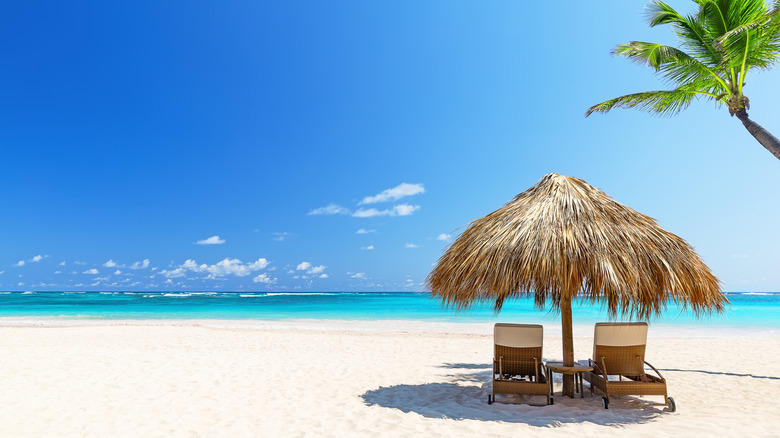The Worst Beachgoer Habits That Will Put A Damper On Everyone Else's Day In The Sun
The simple delights of a beach vacation are so cemented in the eyes of the general population that it's sometimes easy to forget that they can be as stressful as any other kind of trip away. The weather can be fickle, the beaches can be crowded enough to exchange sweat with passersby, and, in certain locales, the presence of unwelcome marine wildlife can put a real damper on things. Still, while an ocean-clearing shark sighting is hardly ideal, and an early monsoon is a legitimate point of lamentation, such events are atypical. When it comes to lists of things that can ruin a day out at the beach, fellow beachgoers rise to the top like flotsam cresting a foamy wave.
Lack of consideration is testing at the best of times, but ignorance while you are trying to soak up some sun? Distractions while you find yourself in the throes of a good novel? Such things are enough to cause an internalized sunstroke entirely of your own devising. So, whether you are searching for the cheapest destination for a European beach vacation or simply curious to find out if your pet peeves line up with those of a seasoned beachgoer, this list is for you. Because knowing what is likely to annoy you is the first step towards avoiding it altogether.
Loud music
There is, so it is said, no accounting for taste. Take country music, for example. While 18% of women are happy to endure its southern twang, that figure drops to 8% for men (per Coleman Insights). The number halves again on its way to assessing younger listener habits. Meanwhile, a commonly held axiom states that the more divisive a person's music taste, the louder they tend to play it. Such a notion is problematic when it comes to a surf-and-sand day out.
There are many ways to enjoy the beach. For some, it's all about the water. Others want to play sports, children wish to make sandcastles, and for those of us interested in exploring the limits of inertia, none of the above fits quite nicely. Reading a good book, sipping a chilled drink, or perhaps simply indulging in a series of never-ending naps? It's as good a way to spend a vacation as any. And it's also why excessive noise sucks. Sure, kids want to play, and such things are mere background sounds that merge with the crashing of the waves and the screeching of the gulls. The same cannot be said for the dissonant blaring of overly loud music.
The idea of taking music to the beach really took off with the birth of the transistor during the 1950s. Such items were low-powered by modern standards, and the tinny blaring of nascent rock and roll was tolerable. Today, a simple Bluetooth phone hook-up can reach 124 decibels, which is concert-level loud, in case you were wondering. And sure, law enforcement isn't going to stand for that. But as far as the whomp-whomps of less powerful rigs are concerned, the best thing to do is find another spot.
Littering
It's a happy fact that the modern age has left us spoiled for choice when it comes to beachfront vacations. From Oregon's charming coastal getaways to Europe's cheapest beach destinations, finding a spot to throw down your towel has never been easier. We ask so little: Sunshine, a cool breeze, and pristine white sands. Sadly, that latter criterion often proves elusive.
To start with, many beaches are now clogged with human waste by default. Sewage is routinely poured into the world's oceans; remember, beach foam is your enemy, so stay away from it. Meanwhile, thousands of tons of plastic wash ashore every single day. Ever-fickle, the currents take such waste where they will, and some places — looking at you, Freedom Island — are worse hit than others. Still, it is not the environmental catastrophe of our own making that is of principal annoyance. Chances are, if you opted to visit a specific beach, you already chose one either spared from global contamination or of enough importance to the local economy that it is swept clean regularly. Enter pet peeve number two: the beachside litterer.
We are loath to leave a carefully staked-out spot. A trip to the beach is a logistical nightmare, no question. There are hats to pack, chillers to fill, a smorgasbord of ointments to remember, and chairs, bottles, and bathing suits to pack. All of which needs to be cleared up. Wrappers, smoldering barbecues, discarded items of clothing, the remains of gnawed chicken wings, and orphaned towels are a blight. In some cases, the littering is transient; things are left strewn around by those conscientious enough to take them home with them. In other cases, they are permanent reminders of how people can make a once-pristine beach look like a Jackson Pollock painting.
Ignoring the flags
Flags on beaches exist for a reason, and there are few things as annoying as people who refuse to acknowledge that point. Beaches are dangerous places, or rather, the oceans they share real estate with can be. You might, for example, find yourself on one of the most shark-infested beaches in the world, or you could instead spend some time stretched out on New Smyrna in Florida. Known worldwide for a high propensity of venomous snake bites, it endures such a questionable accolade with considerable dignity. Neighboring Panama City Beach suffers from deadly rip tides, and the Great Barrier Reef is infested with jellyfish that can sting an actual syndrome into you. To the victor, the spoils, but humanity has at least one way of fighting back. Yeah, flags.
You might think you know the system, but the reality of it is that there is no international standard when it comes to such ensigns. In Australia, for example, red flags mean no swimming, red and white together mean evacuate the water — almost certainly in response to a shark sighting — and yellow flags are advising caution. South Africa's system is similar, but they also fly pennants declaring how certain they are that a shark can be spotted in time to red-flag everyone the hell out of the water.
Anyone ignoring such warnings is not only putting themselves in danger, but they also run the risk of causing a major disruption. Megaphones appear. Lifeguards attempt to get the attention of someone who has decided that great white sharks are misunderstood, thinks that swimming with surfers is fun, or just likes the thought of wrestling with a deadly box jellyfish or two. It sometimes takes an age for them to realize they are the ones being yelled at and even longer to negotiate their way to beachside compliance.
The towel shake
There's an awful line from a decidedly average Star Wars movie about how horrendous sand is. Yes, it's coarse, rough, and irritating, and, sure, there is a cost to lying on a beach all day. You'll pay that price over the weeks and months to come as you find sand in some unusual places.
Indeed, the demerits of sand have no doubt been understood since well before recorded history, but that doesn't seem to stop people from going to the beach. The market is, after all, worth $240.03 billion a year for a reason (according to the Business Research Company), and sand in shoes is no barrier to the proactive fun of a sunny day.
Still, there's no excuse for having to wear someone else's sand, and shaking a towel in close proximity to fellow sunseekers is liable to create a sandstorm in miniature. Said sand gets in people's food, hair, clothes, and sometimes their eyes. That you should think twice before shaking it out on the beach should go without saying. There is a time and place for such things. And when it comes to sandy towels, the time is not now, and the place is somewhere far away from me. Or, you know, you.
PDAs
For those who are unaware of the term, PDA is short for public displays of affection. It's a term often used by that not-quite-prudish-yet-not-entirely-relaxed segment of society who prefer things to be kept very much on the down low. To be clear, there is an unspecified yet identifiable line of demarcation at play here. People holding hands and pecking each other on the cheek is something that most people have managed to assimilate without too much reddening of their cheeks. Anything more than that simply has no place on the beach. Because, you know, nobody wants to see that.
In the Maldives, such activity is actually illegal and can lead to serious consequences. Elsewhere, such as on the notoriously badly behaved Bondi Beach, you're more likely to simply be asked to leave or, if a repeat offender, perhaps even barred for the remainder of your stay. Finding the right balance is really all about understanding your fellow beachgoers, cross-referenced with knowledge of the laws and local customs of your chosen vacation. There are, thankfully, many welcoming LGBTQ-friendly islands out there, but there are also places where they will arrest you for same-sex holding of hands. Equally, some places simply require more modesty than others. Awareness of such things is at least as important as respecting those around you on the beach. Kids are playing, beach balls are flying, and some of us just want to finish that book.
Digging holes
There are as many tried and true beach-going activities as there are stars in an admittedly overcast sky. The proud tradition of building sandcastles dates back to at least the 14th century, and people have been rushing to the beach for games of volleyball for well over a century. What, then, could be more wholesome than grabbing a bucket and seeing how far down you can get?
Well, quite a lot, really. To start with, there is nothing wrong with digging holes per se; it's what you do with them that really matters. Firstly, they should not be too deep. Deep holes on a beach are dangerous for a couple of reasons. Firstly, they can collapse with you or someone else inside them. There have even been fatalities. Second, they are hard to spot, and falling into one can lead to all kinds of unpleasant injuries.
Which is not to say that holes should never be dug. Beaches are about fun, and digging holes is part of a time-honored tradition. It's just that there are two important caveats to bear in mind: the hole should be shallow enough that there is no danger of it collapsing atop anyone. And, crucially, you should take pains to fill it back in once you are done with it. Tripping hazards suck, and while a face full of sand is better than a face full of concrete, it's still one of those vacation events best avoided.
Personal space and smoky barbecues
In the travel brochures of old, every beach was a hidden paradise of turquoise water populated by half a dozen extraordinarily attractive fellow travelers and little else. Such places do, of course, exist. They just skew more towards the overcrowded side of the mark. There's a 1,600-foot stretch of sand in China that receives up to 60,000 visitors a day during peak weekend traffic. Sardinia's La Pelosa Beach resembles an inner-city rush hour scrum for most of the summer. Meanwhile, Bondi Beach looks like a major sporting event gone wrong. Pro tip: Take a ferry to the nearby Manly Beach instead and thank me later.
Sadly, crowds are just one of those things we must deal with if we want to enjoy a little R&R by the sea. Even when we attempt to think outside the box and visit underrated European countries without the crowds, personal space can still be an issue. And an annoying one at that. Fellow sunseekers planting themselves right next to you when there is plenty of space? That's a hassle right there, but subsequent behavior can turn the event into an exercise in curated torture. Bickering couples, screaming children, and food cooked (poorly) on why-haven't-they-banned-them-yet single-use barbecues? It's sometimes worse than loud music, which of course they might also be playing.
Bodily fluids
The exact definition of a tourist beach is hard to pin down. There's an assumption of fame, a certain style, and crowds are a given. Still, not all of the world's most famous beaches are like that. Some are remote enough to enjoy exclusivity, while others, such as Boulders Beach, are simply known as places where you can get up and personal with penguins. (Pro tip number two: penguins bite, and they poop everywhere.) Still, tourist beaches tend to have infrastructure. Less populated regions do not.
A question as old as civilization, then. Where to go? The ocean can take care of the need to wee. Sorry, but we all know it's true, and scientists are cool with it, apparently. Alas, biology majors will have realized that that doesn't quite cover all the bases. Number twos and treading water mix like oil and water, and for much the same reason. Sadly, that doesn't leave many options for those of us too civilized to start digging holes. And yet, people do dig holes.
For the most part, it is parents with children. The solution seems straightforward: The child must go, holes can be filled in, and moments later it's like nothing happened. Until, of course, the next day, when an unsuspecting tourist sits atop the unmarked grave and disinters a stool. Sadly, adults are also getting in on the act. Wasaga Beach in Ontario was in the crosshairs recently (as reported on Global News), with claims that some people were setting up small tents and using them as washrooms. The answer is to go somewhere else. Go before you arrive, go find a café and buy a croissant, or, in extremis, your child's biological expression can find its way into a plastic bag and be disposed of later.
Excessive social media posing
News flash: I don't want to be on your Instagram feed. We live in a world of endless selfies, and it's true, auto-blurring of backgrounds is a thing nowadays, but some of us just don't like cameras pointed in our direction in the first place. Beaches are a place to unwind, and nobody wants to suck in their stomach every few minutes for fear they're a de facto extra in a play they never signed up for. And that's only half of the reason it's annoying.
The endless posing, the Vox popping to camera, the shot after shot after shot of a beach which really doesn't change much from moment to moment. It's performative; it detracts from the natural beauty of the surroundings. It's also irritating, like posing in front of Stonehenge and treating the ancient monument as an afterthought, a point-of-order flagpole marking the road to windswept and interesting.
And then there are the drone shots. Wonders of modern science they may be, but they are also noisy, low-key, dangerous, and unnecessarily self-indulgent. Unless you are playing guitar in a '90s rock music video or you just so happen to be getting married on the beach, there's little need for a sweeping vista of the event. Indeed, the beachside drone has become so ubiquitous and annoying in some places that it has been banned outright. Sure, unforgettable adventures await you in Thailand's coastal ecosystem, but flying a drone there can get you arrested. Drones are also banned in Goa, India, and even where they are permitted, there are specific rules that must be followed. Which, of course, some people ignore.
Overly revealing clothes
According to Aunt Lydia in Margaret Atwood's "The Handmaid's Tale," modesty is invisible. There's a certain poetic charm to such a notion, but when it comes to dental floss bikinis and three-sizes-too-small Speedos, more is, often, well, more. Wanting a little coverage is not about being a prude. There are places to go that are less family-oriented, and there are cultures that (as with PDA) are less conservative than others. Europeans are more relaxed about such things than Americans, and many South Americans gave up caring a long time ago. But, no, most beaches in Europe do not allow nudity, and those places that do are clearly marked.
The notion of not being able to unsee certain things is something of a hot topic. Body shaming is not okay, and ideally, people should be free to wear whatever they like. Indeed, it's not even that new; the German Free Body (Freikörperkultur) movement dates to 1898. Today, there are thousands of places dotted about Europe where nudity is allowed, and in such places, it is the wearing of clothes that is not permitted. And therein lies the rub.
In as clear a case of horses for courses as you'll ever find, it's all about managing the tender sensibilities of your fellow sunseeker. Wandering around in a sheepskin coat is not okay on nudist beaches, and wearing next to nothing is not so welcome on the family beach. Not everywhere wants to be the Copacabana; avoiding Brazil's most crowded beaches for a nearby island paradise is often a good call. And a modest one at that.
Methodology
Over the course of many years of travel, I've developed a sixth sense for how to avoid daily irritations. Time spent on beaches on every continent, with the notable exception of Antarctica, has given me the opportunity to see the best and worst behaviours out there. Of course, it's not all about personal pet peeves. Throughout the article, I referenced opinion polls and research into what beach behaviors truly annoy the most, then combined them with personal experience to create the list you see before you.
